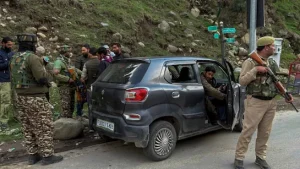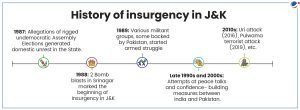New Delhi – Major cities across India including Delhi, Mumbai, Jaipur, and Amritsar have been placed on high alert following Tuesday’s deadly Pahalgam terror attack that claimed 26 lives, mostly tourists. The assault, which took place at the popular Baisaran meadow near Pahalgam town in Jammu and Kashmir, marks the deadliest incident in the Valley since the 2019 Pulwama strike.
Details of the Pahalgam Terror Attack

The Pahalgam terror attack unfolded around 3 PM on Tuesday when terrorists opened fire at tourists in Baisaran, an expansive meadow commonly referred to as ‘mini Switzerland’ located approximately six kilometers from the resort town of Pahalgam. According to eyewitnesses, the assailants targeted visitors who were enjoying leisure activities at the popular tourist destination – some taking pony rides, others picnicking, or patronizing local eateries.
Among the 26 victims of the Pahalgam terror attack, officials confirmed two were foreign nationals and two were locals. The remaining casualties included domestic tourists from multiple states including Karnataka, Maharashtra, Haryana, and Uttar Pradesh. The injured include at least one person from Gujarat, three from Tamil Nadu, and two from Maharashtra.
“The toll is still being ascertained,” said Jammu and Kashmir Chief Minister Omar Abdullah, who described the Pahalgam terror attack as “much larger than anything we’ve seen directed at civilians in recent years.”
Officials reported that 22 of the 26 victims have been identified, while efforts are ongoing to determine the identities of the remaining four casualties of the Pahalgam terror attack.
National Security Response to the Pahalgam Terror Attack


In response to the Pahalgam terror attack, security measures have been substantially reinforced across major Indian cities. Delhi Police have intensified checking and surveillance throughout the capital, with particular emphasis on tourist attractions and border checkpoints. Traffic movement has also been regulated in sensitive zones.
The heightened alert coincides with the ongoing visit of US Vice President J.D. Vance to India, which had already prompted increased security measures in Delhi and other major urban centers prior to the Pahalgam terror attack.
Prime Minister Narendra Modi, who was on a two-day visit to Saudi Arabia when the Pahalgam terror attack occurred, cut short his trip and returned to New Delhi on Tuesday night instead of Wednesday as originally scheduled. The attack has sent shockwaves throughout the country, drawing widespread condemnation and outrage from citizens and officials alike.
Also Read: Bold Waqf Act Provisions Paused by Centre Till May 5 Amid S.C. Scrutiny
Impact on Tourism and Regional Stability
The Pahalgam terror attack has struck just as the tourist and trekking season was gaining momentum in the region. Pahalgam, particularly the Baisaran meadow where the Pahalgam terror attack took place, is a renowned tourist destination that attracts visitors from across India and internationally.
The timing of the Pahalgam terror attack raises significant concerns about regional stability and security. Coming during US Vice President Vance’s visit to India, the incident may have broader geopolitical implications. Security analysts suggest the Pahalgam terror attack could be an attempt to disrupt peace in the Kashmir Valley and damage the region’s tourism-dependent economy.
Historical Context of Violence in Kashmir


The Pahalgam terror attack represents the deadliest assault in the Kashmir Valley since the February 2019 Pulwama attack, which claimed the lives of 40 Indian paramilitary personnel. That incident triggered significant escalation in tensions between India and Pakistan.
Over the past few years, Jammu and Kashmir had been experiencing a relative decrease in major terrorist incidents targeting civilians. The Pahalgam terror attack marks a disturbing disruption to this trend, potentially signaling a resurgence of terrorist activities in the region.
Security Measures in Major Cities
Following the Pahalgam terror attack, authorities have implemented comprehensive security protocols across metropolitan areas:
Delhi
After the Pahalgam terror attack, Delhi Police have significantly ramped up security across the national capital. Tourist destinations, transportation hubs, markets, and religious sites are under enhanced surveillance. Border checkpoints have implemented stricter verification procedures, and police presence has been visibly increased throughout the city.
Mumbai
The financial capital has also heightened its security apparatus in response to the Pahalgam terror attack. Maharashtra Police have deployed additional personnel at railway stations, airports, and other public spaces. Coastal security has been reinforced to prevent any potential seaborne threats.
Other Major Cities
Similarly, Jaipur, Amritsar, and other metropolitan areas have intensified security following the Pahalgam terror attack. Authorities are conducting more frequent patrols and have established additional checkpoints at critical locations.
Looking Forward
As investigations into the Pahalgam terror attack continue, questions emerge about potential perpetrators and the broader implications for regional security. Intelligence agencies are working to determine whether the attack represents an isolated incident or signals a more coordinated campaign.
The Pahalgam terror attack comes at a politically sensitive time, with regional dynamics in flux. Security experts note that terrorist organizations may be attempting to exploit this uncertainty through high-profile attacks like the one in Pahalgam.
In the coming days, authorities are expected to further tighten security measures nationwide while pursuing those responsible for the Pahalgam terror attack. Meanwhile, the nation mourns the loss of innocent lives in what has become the deadliest terrorist incident in the Kashmir Valley in over five years.

